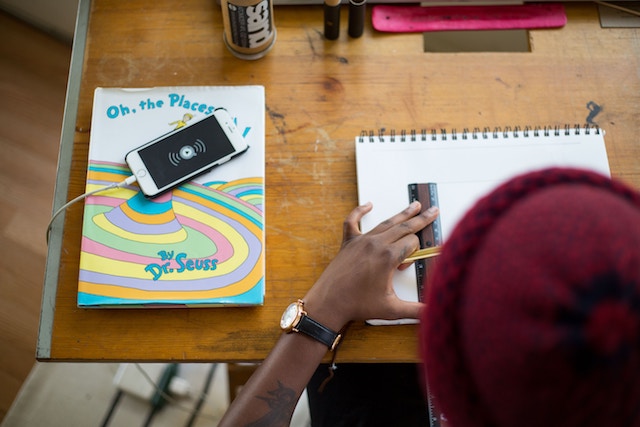Unlock the Magic in Your Story Now
Get the Free 20 questions to Ask Before Launching Your Idea workbook when you sign up for occasional updates.
Get the Free 20 questions to Ask Before Launching Your Idea workbook when you sign up for occasional updates.
Articles filed in: Meaningful Work
The Power Of Reflective Practice
filed in Meaningful Work, Strategy, Success

My mother can practically bake a killer apple tart in her sleep. It’s a skill she’s learned over decades of trial and error. We hone any skill by doing. We get better by practising and observing, then reflecting and iterating.
The doctor perfects her bedside manner by reflecting on how a consultation went.
The salesperson gets better at closing deals by assessing what did or didn’t work on his last sales call.
The speaker improves by noticing how the audience reacts and thinking about how she could get more engagement during her next talk.
Practice alone won’t make us perfect. Progress happens when we make time for thinking as well as doing.
Image by Jessica Fiess Hill
In Praise Of Incrementalism
filed in Meaningful Work, Strategy, Success

One of my favourite TV programs, when I was young, was Columbo—which followed the sometimes scruffy, seemingly absentminded, always polite, homicide detective, who solved murder cases in Los Angeles.
What struck me about Columbo was the stepwise way he made progress towards solving the case. He wasn’t necessarily looking for the big breakthrough, he was searching for the next smallest clue that would lead him to his goal.
It’s easy to seduced by the illusion of the big breakthrough. But what we see in all walks of life, not just in detective stories, is that it’s the commitment to patient, gradual progress that gets us to where we want to go.
Incrementalism is underrated.
*Do you need help to make stepwise progress in your business or career? Then our group mentorship experience at the Right Company might be for you. We’re accepting applications for a handful of new members this week.
Image by Volodymyr Hryshchenko
Giving Attention Vs. Getting Attention
filed in Meaningful Work, Strategy, Success

The more people have to attend to, the harder it is to get their attention.
Attention is a precious resource. And as with any resource, scarcity creates value.
Our culture has taught us that those who can capture the most attention win—never more so than in the digital age. So, we devote a considerable amount of time and effort working out how to mine other people’s attention—often adding to the noise.
What if instead of showing up to get attention, we showed up to give it, without expectation? Imagine the resources we could build if we spent the majority of our time attending to how we could help instead of trying to be seen.
Image by Daniel Funes Fuentes
Empathy Creates Value
filed in Meaningful Work, Strategy, Success

A restaurant host has one job to do—meet and greet diners and show them to their table.
It sounds easy enough, but the difference between a good host and a great host is underrated because where people are seated directly impacts their experience. Seating arrangements can influence how long diners spend at a venue, how much they spend, and whether they come back.
One Saturday, at a cafe near where I live, a woman arrives alone with a Moleskine notebook under her arm. She wants coffee and a small table in a quiet corner.
The young couple with two small children need a spot where they can spread out and relax over pancakes without feeling like they’re disturbing other diners.
Even though the cafe is empty, the host seats both parties at the same big communal table in the middle of the dining room. They smile politely and look disappointed, but don’t ask to be moved. Sadly neither group gets the experience they want that day. The young parents snap at their kids in an attempt to keep them quiet. The woman with the notebook puts it away within minutes, finishes her coffee and leaves.
In his quest for efficiency, the host forgot that the purpose of the cafe isn’t just to serve food and drinks—it’s also to have the empathy to discern how to treat different customers differently.
We create value and deliver joy when we make the people we serve feel like they matter. What better goal can we have for the work we have the privilege to do?
Image by Petr Sevcovic
The One Thing
filed in Meaningful Work, Strategy, Success

A novel is written one word, one sentence at a time. A marathon completed in strides, not miles. Every day we stand on the shoulders of the effort we made the one before.
We don’t make progress, we choose it.
What’s the one thing you could do today that would make a difference to your work?
What’s the one you could stop doing today that would have an impact on your progress?
What’s the one thing you need to learn to get you closer to your goal?
What’s the one thing you need to unlearn to change your perspective about what’s possible?
What one thing are you willing to do today in service of tomorrow?
Image by CJ Dayrit
The Best Laid Plans
filed in Meaningful Work, Strategy, Success

This day ten years ago you probably had plans in place for the year ahead. Maybe you achieved some of those goals in 2010. But I’m guessing that you could never have planned for some of the unexpected events, opportunities, twists and turns of the decade you’ve just lived.
It turns out that it’s harder to predict the future than we think because we underestimate how much we, and the world will change over time. As psychologist, Dan Gilbert says;
‘Human beings are works in progress that mistakenly think they’re finished. The person you are right now is as transient, as fleeting and as temporary as all the people you’ve ever been. The one constant in our life is change.’
Ten years ago, I had just started blogging. I had no plans to write a book. I couldn’t have imagined building an online community, the joy of teaching story skills to thousands of people or speaking at TEDx. None of those things happened because I had a five year or a ten-year plan. They happened one blog post, one idea, one conversation at a time. Long-term goals, dreams and intentions are worthy, but they only eventuate because of our short-term actions.
Here’s to the next decade of showing up to do work we’re proud of and building a world that’s better for our being here.
Image by Tamarcus Brown
Needs And Wants
filed in Meaningful Work, Strategy, Success

As creators, marketers and salespeople, we are, quite rightly, used to obsessing about our ideal client’s needs and wants.
After all, if we don’t understand what the people we care about serving care about, we’re unlikely to get the opportunity to serve them.
But if we are to do our best work, we must also be intentional about the kind of business and life we want to build. We often default to prioritising our needs while neglecting our wants.
What do you care about?
What kind of work serves you?
What do you need?
What do you want?
Image by Alice Achterhof
A Question Of Choices
filed in Meaningful Work, Strategy, Success

What makes you the best choice for the people you want to serve?
What makes these people the best choice for you?
What stories do you choose to tell your right people about the value you create?
What stories do your right people choose to believe about the value you deliver?
What choices do you make every day about how to build your right business?
How do those choices help you to earn the trust of the right people?
Our choices not only determine our priorities, plans and results—they are also clues about what matters to us.
Image by Maarten van den Heuvel
The Daily Opportunity
filed in Meaningful Work, Strategy, Success

We tend to think of opportunities as make or break moments. Those once in a lifetime happenings that could have accelerated our dreams if only we’d grabbed them before they passed us by.
But meaningful progress doesn’t happen in a single, magical alignment of the stars.
Opportunity can’t pass us by because it’s available to us in this moment and the next one.
The stars align when we show up every day to make the most of the opportunity that’s right in front of us.
Image by Jeff Sullivan
By Heart Vs. With Heart
filed in Meaningful Work, Success, Worldview

When we were taught poetry in primary school, my classmates and I were encouraged to learn verses by heart. The teacher would call upon us during a lesson to stand and recite a poem or a verse.
This was how we learned the words that were written without understanding the depth of their meaning. We knew the poems by heart, but we didn’t know what to make of them or why they should matter to us because we never learned to say them with heart.
We have the opportunity every day to work by heart or to choose to do it with heart.
The more often we choose the latter the better for all of us.
Image by Josh Applegate